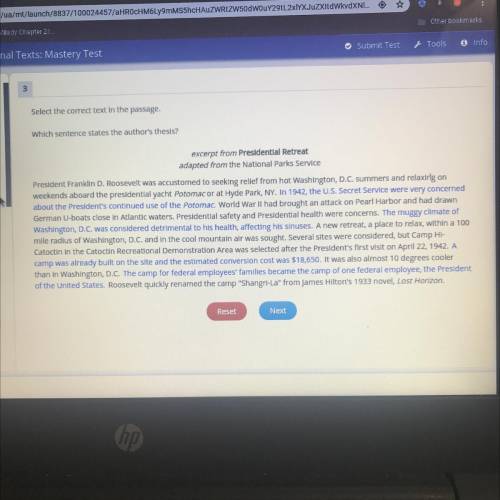Which sentence states the author's thesis?
excerpt from Presidential Retreat
adapted from the...

English, 14.01.2021 07:20 keriyannafultz
Which sentence states the author's thesis?
excerpt from Presidential Retreat
adapted from the National Parks Service
President Franklin D. Roosevelt was accustomed to seeking relief from hot Washington, D. C. summers and relaxing on
weekends aboard the presidential yacht Potomac or at Hyde Park, NY. In 1942, the U. S. Secret Service were very concerned
about the President's continued use of the Potomac. World War II had brought an attack on Pearl Harbor and had drawn
German U-boats close in Atlantic waters. Presidential safety and Presidential health were concerns. The muggy climate of
Washington, D. C. was considered detrimental to his health, affecting his sinuses. A new retreat, a place to relax, within a 100
mile radius of Washington, D. C. and in the cool mountain air was sought. Several sites were considered, but Camp Hi-
Catoctin in the Catoctin Recreational Demonstration Area was selected after the President's first visit on April 22, 1942. A
camp was already built on the site and the estimated conversion cost was $18,650. It was also almost 10 degrees cooler
than in Washington, D. C. The camp for federal employees' families became the camp of one federal employee, the President
of the United States. Roosevelt quickly renamed the camp "Shangri-La" from James Hilton's 1933 novel, Lost Horizon


Answers: 1


Another question on English

English, 21.06.2019 19:00
Which change should be made to improve this sentence? allen jumped in the puddle and his new shoes got wet and muddy.a)the new shoes got wet and muddy and allen jumps in the puddle.b)allen jumped in the puddle and got his new shoes wet and muddy.c)allen jumped in the puddle and gets his new shoes wet and muddy.d)the new shoes are getting wet and muddy and allen jumped in the puddle.
Answers: 1

English, 21.06.2019 23:30
1. at the conclusion of chapter 13, the monster realizes that he has none of the qualities or possessions that human beings value, and so he worries the he will be forever miserable. he says, “oh, that i had for ever remained in my native wood, nor known nor felt beyond the sensations of hunger, thirst, and heat! ” this statement recalls one made by victor frankenstein in chapter 10: “if our impulses were confined to hunger, thirst, and desire, we might nearly be free; but now we are moved by every wind that blows, and a chance word or scene that that word may convey to us.” questions: what do these two statements suggest about the impact of knowledge? how do the statements affect the way readers view the monster and victor?
Answers: 1

English, 22.06.2019 03:10
Mr. underwood's editorial defending tom robinson is surprising because he's described as not wanting to be near negroes it's a dangerous stance to take at that time he had been neutral during the trial he wasn't in the courtroom
Answers: 1

You know the right answer?
Questions


Physics, 04.11.2019 15:31



Mathematics, 04.11.2019 15:31




Mathematics, 04.11.2019 15:31

Mathematics, 04.11.2019 15:31

Mathematics, 04.11.2019 15:31

Mathematics, 04.11.2019 15:31



Engineering, 04.11.2019 16:31







